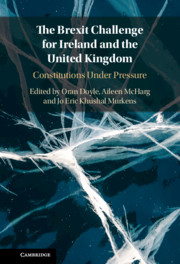Book contents
- The Brexit Challenge for Ireland and the United Kingdom
- The Brexit Challenge for Ireland and the United Kingdom
- Copyright page
- Contents
- Figures
- Tables
- Contributors
- Preface
- The Constitutional Tensions of Brexit
- Part I Territorial Pressures in Ireland and the United Kingdom
- Part II Institutional Pressures and Contested Legitimacy
- 8 Populism and Popular Sovereignty in the UK and Irish Constitutional Orders
- 9 Party, Democracy, and Representation
- 10 Westminster versus Whitehall: What the Brexit Debate Revealed About an Unresolved Conflict at the Heart of the British Constitution
- 11 Brexit and the Problem with Delegated Legislation
- 12 Litigating Brexit
- 13 The Law Officers: The Relationship between Executive Lawyers and Executive Power in Ireland and the United Kingdom
- 14 In Search of the Constitution
- Index
9 - Party, Democracy, and Representation
The Political Consequences of Brexit
from Part II - Institutional Pressures and Contested Legitimacy
Published online by Cambridge University Press: 17 August 2021
- The Brexit Challenge for Ireland and the United Kingdom
- The Brexit Challenge for Ireland and the United Kingdom
- Copyright page
- Contents
- Figures
- Tables
- Contributors
- Preface
- The Constitutional Tensions of Brexit
- Part I Territorial Pressures in Ireland and the United Kingdom
- Part II Institutional Pressures and Contested Legitimacy
- 8 Populism and Popular Sovereignty in the UK and Irish Constitutional Orders
- 9 Party, Democracy, and Representation
- 10 Westminster versus Whitehall: What the Brexit Debate Revealed About an Unresolved Conflict at the Heart of the British Constitution
- 11 Brexit and the Problem with Delegated Legislation
- 12 Litigating Brexit
- 13 The Law Officers: The Relationship between Executive Lawyers and Executive Power in Ireland and the United Kingdom
- 14 In Search of the Constitution
- Index
Summary
The narrow victory of the leave campaign at the 2016 referendum on UK membership of the EU introduced a new constitutional divide into British politics; still, the political impact of the referendum remains difficult to assess. The binary identities that emerged after the poll overlapped imprecisely with existing political loyalties. There were also crucial territorial dimensions to post-referendum politics. While England and Wales delivered majorities for leave, in Northern Ireland and Scotland there was majority support for continued EU membership. Moreover, in Scotland, Brexit raised the prospect of a sequel to the 2014 referendum on Scottish independence. Parliamentarians, a majority of whom had advocated remain, struggled to implement the referendum result.
By exposing the distance between the electorate and their representatives, and setting in opposition competing popular, parliamentary and territorial mandates, the impact of Brexit went beyond electoral concerns, bringing into focus questions of legitimacy, representation and sovereignty that are the focus of this chapter. The ‘high’ political consequences of Brexit are assessed first. The constitutional challenges raised by Brexit in a Scottish context are then explored. The final section considers the degree to which Brexit was an example of the rise of forms of political ‘populism’.
- Type
- Chapter
- Information
- The Brexit Challenge for Ireland and the United KingdomConstitutions Under Pressure, pp. 195 - 216Publisher: Cambridge University PressPrint publication year: 2021

